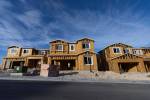Lobbyist: Tax breaks would cost county $30 million a year
CARSON CITY -- A lobbyist for Clark County said Monday that police and parks funding could be jeopardized if the Legislature pushes forward with the tax breaks proposed for construction projects in a revised "green building" bill.
Lobbyist Michael Alastuey complained to the Senate Commerce and Labor Committee that Assembly Bill 621 does little to protect local governments from sales and property tax losses caused by tax abatements companies will receive for constructing more environmentally friendly and energy-efficient buildings.
The bill revises current legislation to protect schools from potential tax losses but still leaves Clark County losing $30 million a year because of the tax abatements, Alastuey said.
"Local governments may not be able to respond to growth," he testified. "We need a bill to fix it. By every scenario, these abatements were generous."
Sen. Randolph Townsend, R-Reno, chairman of the committee, did not take a vote on AB621 on Monday. Instead, he compiled a list of concerns expressed by Alastuey and other witnesses. Townsend said he will hold another hearing today and may conduct a vote on the measure after that hearing.
The Assembly unanimously approved the bill Saturday.
AB621 would continue to provide some financial incentives to companies that construct energy-efficient buildings without providing a "windfall" of tax breaks, according to Assemblywoman Debbie Smith, D-Sparks, who helped craft the bill. She said she has no doubt the bill will become law.
"We are going to show the world we aren't a bunch of country bumpkins here," added Townsend.
Legislators were forced to amend the 2005 "green building" law after finding it would cost the Clark County School District hundreds of millions of dollars over the next decade. That law provides sales tax and property tax abatements for companies that used energy-efficient construction materials.
Smith said the new version will give companies $453 million in tax breaks for energy- efficient construction over the next decade, down from the $971 million estimated under the original law.
"You have to remember local governments are the ones who passed the projects in the first place," Smith said.
"I keep hearing, 'Why did you protect the school districts and not the local governments?' Well the local governments are not an innocent bystander."
Smith said language was placed in the bill to require the preparation of reports showing potential tax losses if a building project qualifies for energy-efficient tax abatements. That way, local government will know their potential losses if they approve a building project.
2007 Nevada Legislature























